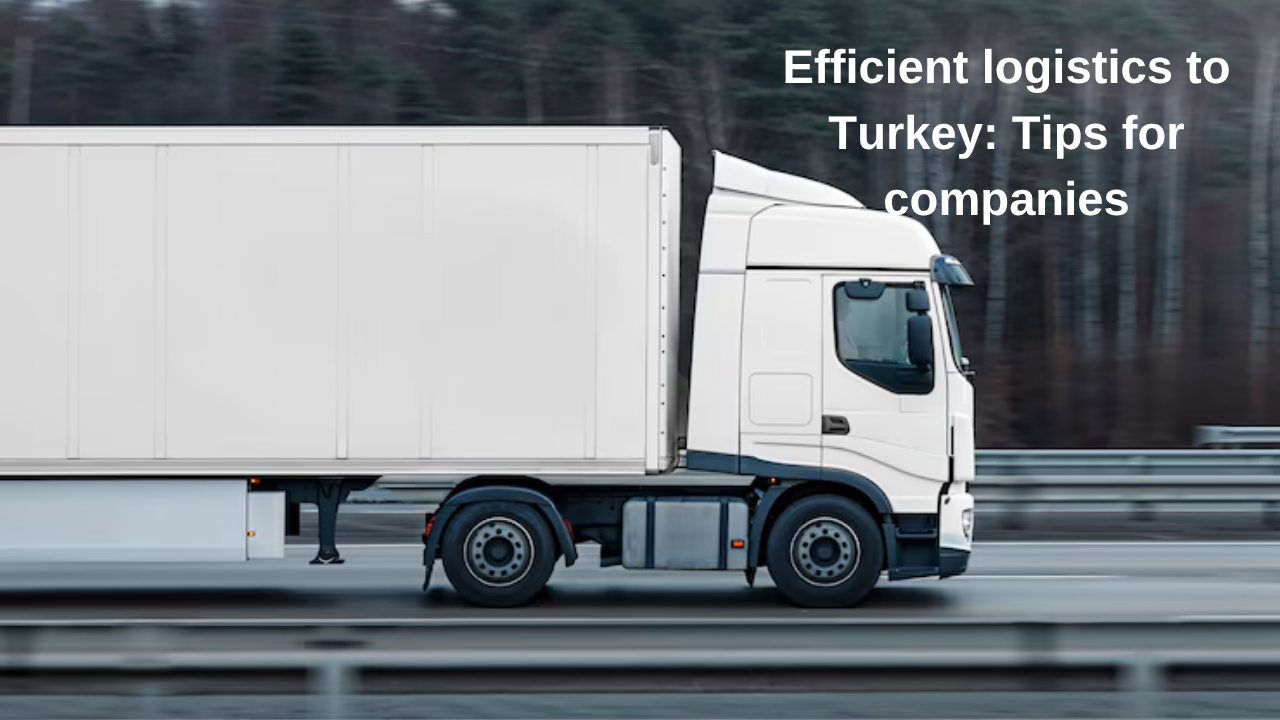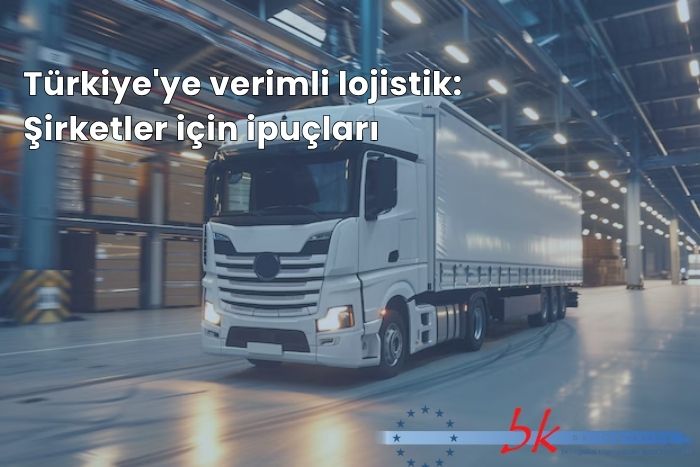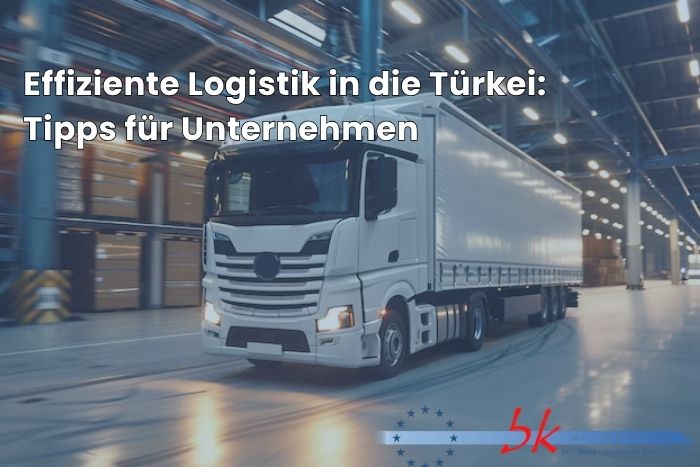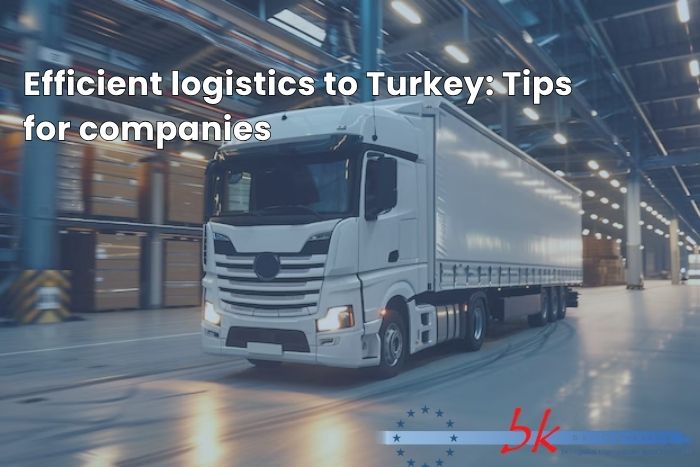News
Efficient logistics to Turkey: Tips for companies
Table of Contents
-
Turkey’s Importance in the Global Logistics Market
-
Strategic Route Planning for Turkey Transportation
-
Efficient Customs Procedures: Best Practices
-
Selecting Optimal Transportation Methods
-
Technological Innovations in Logistics
-
Overcoming Challenges: Solutions for Businesses
-
The Future of Logistics to Turkey
Efficient logistics to Turkey is a critical factor for businesses aiming to succeed in global trade. As a strategic trade hub between Europe and Asia, Turkey offers significant economic opportunities but demands meticulous planning and organization. In 2025, digitalization and automation are transforming the logistics sector, enabling businesses to optimize supply chains, reduce costs, and shorten delivery times. With a trade volume exceeding 40 billion Euros between Germany and Turkey in 2024, Turkey is an indispensable partner. This article provides comprehensive tips on how businesses can refine their logistics strategies for Turkey transportation.
Whether exporting textiles to Istanbul, machinery to Ankara, or electronic components to Izmir, efficient logistics relies on transparency, reliability, and modern technologies. Businesses that skillfully integrate these elements gain a clear competitive advantage, strengthening their market position.
Turkey’s Importance in the Global Logistics Market
Turkey plays a central role in international trade, particularly as a key trade partner of the European Union. Sectors such as textiles, automotive parts, electronics, and machinery manufacturing benefit from this robust economic connection. Turkey’s geographic position, bridging Europe and Asia, makes it a strategic logistics hub. Cities like Istanbul, Izmir, Ankara, and Adana are critical logistics nodes, facilitating fast and efficient connections.
In 2025, Turkey’s significance continues to grow, driven by its dynamic economy and increasing demand for European products. Turkey transportation encompasses various modes, including road, sea, air, and rail. However, businesses must thoroughly understand complex customs regulations, local market conditions, and logistical challenges to avoid delays and additional costs.
Turkey is not only a sales market but also a production base for many European companies. This increases the demand for efficient logistics solutions that cover both exports and imports. A well-thought-out logistics strategy is vital for maintaining supply chain stability and meeting customer demands.
Trade Partner: Strong economic ties with the EU.
Logistics Hubs: Istanbul and Izmir as key nodes.
Growing Market: High demand for European goods.
Strategic Route Planning for Turkey Transportation
Successful logistics begins with strategic route planning. Optimized routes reduce transportation costs and significantly shorten delivery times. For example, a business exporting electronics to Istanbul can save several days and reduce costs by selecting the most efficient route.
Real-time tracking is essential to avoid traffic bottlenecks at key border crossings like Kapıköy. Modern logistics software utilizes real-time traffic and weather data to dynamically determine the best routes. Businesses should collaborate with logistics partners who combine local expertise with advanced planning tools to ensure precise coordination and minimize unexpected delays.
Additionally, companies should evaluate alternative routes to maintain flexibility. Opting for less congested border crossings during peak periods can save time resources. Close collaboration with freight forwarders familiar with Turkish infrastructure and traffic conditions is another key to success.
Route Planning: Saves costs and time.
Tracking Systems: Live updates for transparency.
Partnerships: Leveraging local expertise.
Efficient Customs Procedures: Best Practices
Customs procedures are among the most complex aspects of Turkey transportation. Turkey’s customs regulations require precise documentation, such as commercial invoices, certificates of origin, and additional certifications for goods like chemicals or food products. Errors in documentation can lead to significant delays or penalties.
In 2025, digital customs systems significantly accelerate processing. Businesses should submit documents in advance via online platforms to minimize border wait times. Collaborating with customs consultants or experienced logistics partners ensures compliance with all regulations. Regular training for employees handling customs procedures can also help minimize errors.
Free trade agreements between the EU and Turkey can reduce duties on certain goods. Businesses should research these agreements to optimize costs. Pre-aligning with suppliers and customers on required documentation further streamlines the process.
Documentation: Error-free and complete paperwork.
Digitalization: Fast customs processing.
Consultancy: Compliance through experts.

Selecting Optimal Transportation Methods
Choosing the right transportation method is critical for efficient logistics. Road transportation is the most flexible option, offering deliveries within three to five days. However, border crossings like Kapıkule or Habur can experience congestion during peak periods. Businesses should leverage traffic forecasts to minimize these delays.
Sea transportation is suitable for large-volume cargo, such as textiles or raw materials. With delivery times of ten to fourteen days, it is more cost-effective but requires longer lead times. Ports like Izmir and Mersin are central transshipment hubs for sea freight. Air transportation is the fastest option, ideal for urgent shipments like pharmaceuticals or electronics, but its high costs make it suitable only for high-value or time-critical goods.
Rail transportation is gaining importance as a sustainable alternative, offering relief to congested roads. However, Turkey’s rail infrastructure is limited, restricting availability. Multimodal transportation, combining multiple methods, often provides the best balance of cost, speed, and reliability.
Road Transportation: Flexible and fast.
Sea Transportation: Economical for large volumes.
Air Transportation: For urgent deliveries.
Technological Innovations in Logistics
Technological innovations are the driving force behind efficient logistics. Internet of Things (IoT) enables real-time monitoring of cargo conditions, such as temperature, humidity, or vibration protection, which is crucial for perishable goods like food or pharmaceuticals.
Artificial Intelligence (AI) revolutionizes route planning by analyzing traffic data, weather forecasts, and historical delivery data. AI-powered systems can suggest alternative routes to avoid congestion or border bottlenecks. Blockchain technology provides secure and transparent document management, reducing risks of fraud or errors in the supply chain.
Automated warehousing and loading processes accelerate operations. In the near future, drones and autonomous vehicles could play a larger role in Turkey transportation, particularly in urban centers like Istanbul. Businesses investing early in these technologies can sustainably improve their logistics processes.
IoT: Real-time cargo monitoring.
AI: Intelligent route planning.
Blockchain: Secure documentation.
Overcoming Challenges: Solutions for Businesses
Logistics to Turkey presents numerous challenges. Customs delays are frequent, especially during peak periods like holidays or due to incomplete documentation. Digital customs platforms and pre-verification of documents can significantly reduce these delays.
Cost fluctuations due to rising fuel prices, exchange rate changes, or customs duties complicate budget planning. Long-term contracts with logistics partners or hedging strategies can provide cost stability. A shortage of qualified personnel, such as truck drivers, warehouse workers, or customs experts, can cause delays. Businesses should invest in training programs and forge local partnerships to address this gap.
Cultural and linguistic differences can hinder communication with Turkish partners or authorities. Multilingual teams or translation software can overcome this barrier. Additionally, businesses must monitor geopolitical developments, as these can impact trade and logistics. A flexible logistics strategy enables rapid responses to unforeseen events.
Customs Delays: Common during peak periods.
Costs: Affected by fluctuations.
Personnel: Need for training.
The Future of Logistics to Turkey
The future of logistics to Turkey will be shaped by technological advancements and global trends. In 2025 and beyond, digitalization and automation will further enhance efficiency. Businesses investing in AI, IoT, and blockchain can optimize their supply chains while increasing security.
Sustainability is becoming an increasingly critical issue. Customers and regulators demand eco-friendly transportation solutions, such as greater use of rail or electric vehicles. Turkey is investing more in its rail infrastructure, making multimodal transportation more attractive. Businesses should use CO2 tracking tools to monitor emissions and meet reduction targets.
Turkey’s growing e-commerce sector presents new opportunities for logistics companies. Demand for fast deliveries, especially in urban centers, is rising. Innovative solutions like last-mile drones or automated warehouses could meet this need. At the same time, collaboration with local logistics partners is becoming increasingly vital to meet market demands.
Businesses that adapt early to these trends will gain a clear advantage in Turkey transportation. A combination of technological innovation, sustainable practices, and strategic planning will form the foundation of a successful logistics strategy.
Digitalization: Efficiency through technology.
Sustainability: Eco-friendly solutions.
E-Commerce: Growing demand.
For efficient logistics to Turkey, we offer tailored solutions. Learn more and contact us.



